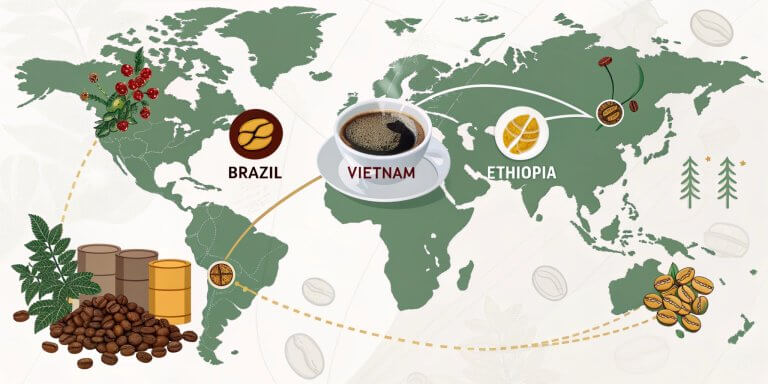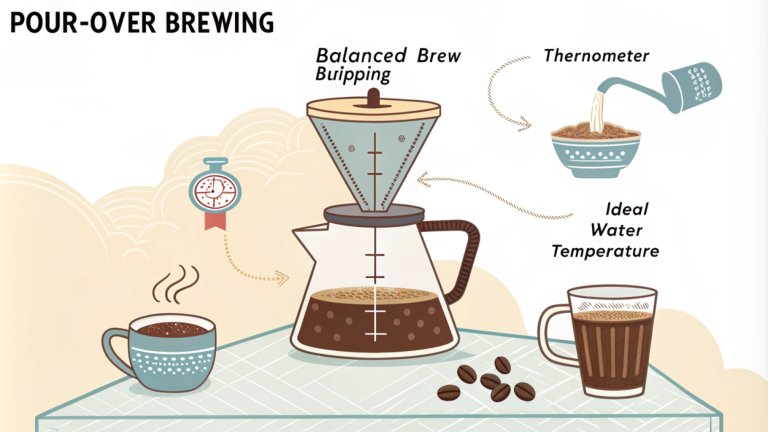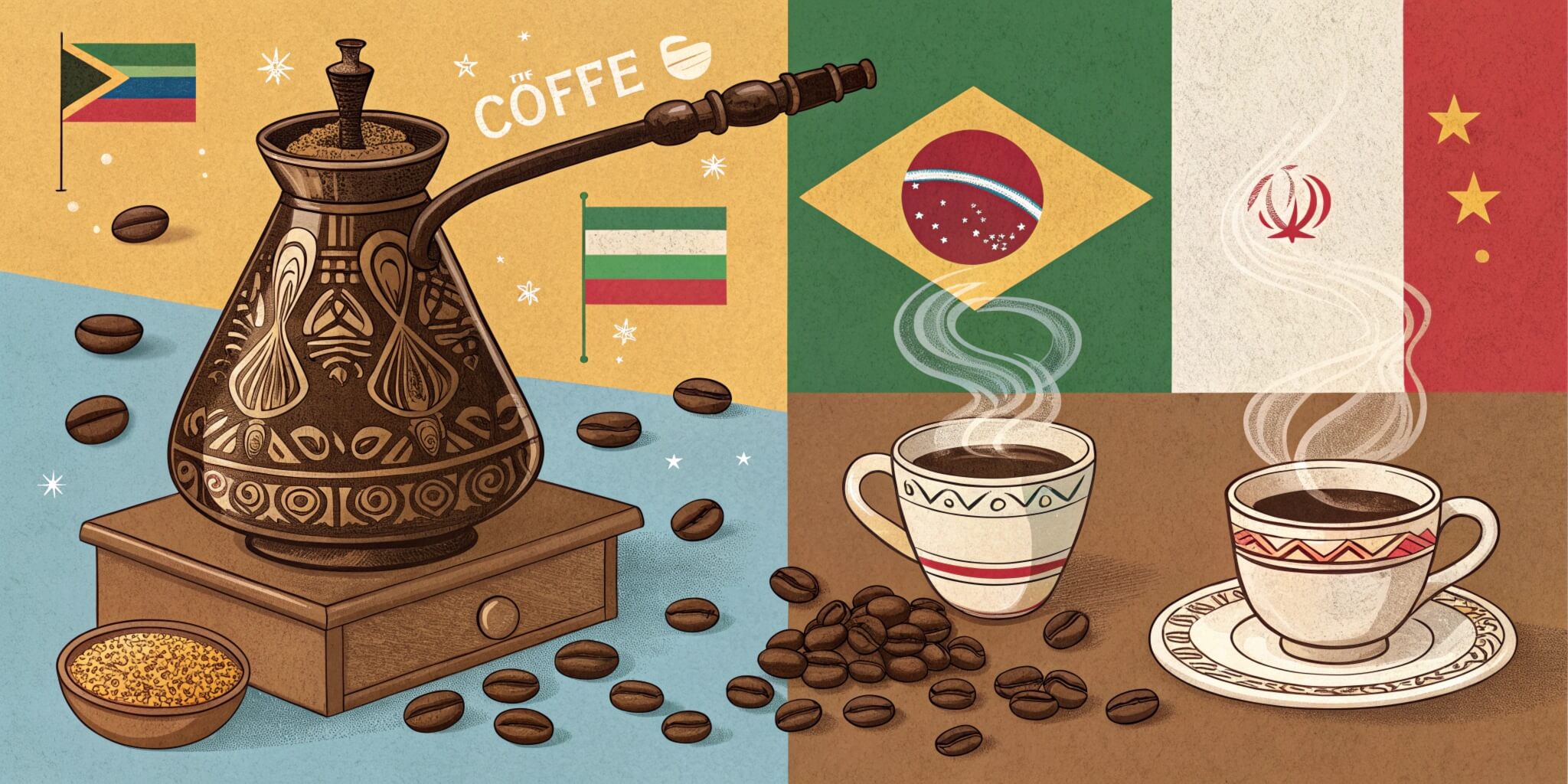
Coffee isn’t just a drink—it’s a shared experience that connects people across continents and cultures. Around the world, different countries have developed their unique coffee rituals, each reflecting the history, values, and social customs of the place it originates. Let’s explore some of the most exciting coffee traditions worldwide, where coffee is not just a beverage but a symbol of hospitality, social interaction, and spiritual practice.
The Ethiopian Coffee Ceremony: Where It All Began
Ethiopia, often hailed as the birthplace of coffee, is a testament to the communal nature of coffee. The word ‘coffee’ is believed to have originated from the Ethiopian region of Kaffa, where the coffee plant, Coffea arabica, was first discovered. In Ethiopia, coffee is not just a beverage; it’s a way of life. The traditional Ethiopian coffee ceremony is a vital social event that can last for several hours. It’s a beautiful sight to see families and neighbors come together to roast, grind, and brew coffee, creating a sense of togetherness and community.
The ceremony usually begins with the hostess roasting green coffee beans over an open flame, producing an aromatic smoke that fills the room. Once the beans are roasted, they are ground and brewed in a unique jebena pot. Coffee is served in small cups, often accompanied by snacks like popcorn or bread.
The ceremony emphasizes patience, hospitality, and community, reinforcing that coffee brings people together.
Italy: The Home of Espresso Culture
In Italy, coffee is synonymous with espresso. Italians have mastered the art of preparing and savoring espresso in a way that mirrors their fast-paced urban life. An espresso in Italy is typically enjoyed while standing at the bar of a café, where locals quickly relish their coffee before heading off to work. Unlike other cultures’ slower, more elaborate coffee rituals, Italian espresso is all about efficiency and flavor, making it a fascinating aspect of global coffee culture.
However, while the drinking process may be fast, the appreciation of coffee quality is profound. Italians take pride in their espresso machines, the beans’ freshness, and the brewing’s precision. Many Italian families have their preferred cafés, and the barista often knows their order without them having to ask.
Turkish Coffee: A Rich Tradition of Taste and Fortune
Turkish coffee, one of the most renowned coffee traditions globally, is as much about the preparation as it is about the coffee itself. Made using finely ground coffee beans, Turkish coffee is brewed in a small pot called a cezve and served in tiny cups. It’s often accompanied by a glass of water and a sweet treat, like Turkish delight. Turkish coffee is celebrated for its intense flavor and thick texture, with the grounds settling at the bottom of the cup, offering a unique and indulgent coffee experience.
An exciting aspect of Turkish coffee is the tradition of fortune-telling. After drinking the coffee, people often turn the cup upside down and wait for the grounds to settle. The patterns left by the coffee grounds are then “read” to predict the future. This practice turns coffee into a drink and a cultural experience, connecting people through conversation and the mystery of what the future holds.
Japan: The Precision of Siphon Coffee
Japan’s coffee culture is deeply influenced by the country’s attention to detail and appreciation for craftsmanship. One of Japan’s most popular coffee brewing methods is siphon coffee, a slow and meticulous process that resembles a science experiment. The method involves heating water in a bottom chamber, which rises into an upper chamber containing the coffee grounds. Once brewed, the coffee is filtered back down into the lower chamber.
Siphon coffee is known for its clean, aromatic flavor, but the brewing process is just as important as the final product. Watching a barista prepare siphon coffee is a mesmerizing experience that turns coffee brewing into a performance. In Japan, this method reflects the country’s broader cultural values of patience, precision, and mindfulness.
Vietnam: The Art of Phin-Filtered Coffee
In Vietnam, coffee is often brewed using a pin, a small metal filter that allows the coffee to drip slowly into a cup. This slow-drip method produces a strong, concentrated coffee that is usually sweetened with condensed milk to create cà phê sữa đá, a popular iced coffee drink. Combining strong coffee and creamy, sweet milk makes for a unique and indulgent flavor.
Vietnamese coffee culture is profoundly social. It’s common to see people sitting at street-side cafés, sipping coffee while chatting with friends or reading the newspaper. The slow brewing process encourages people to take their time and enjoy the moment, making coffee an integral part of daily life and social interaction.
Swedish Fika: More Than Just a Coffee Break
In Sweden, fika is not just a coffee break—it’s a cherished tradition that emphasizes relaxing and connecting with others. The concept of fika encourages people to slow down, share a coffee (often paired with pastries like cinnamon buns or similar), and enjoy a conversation. Whether at home or in a café, fika is a time to pause and appreciate the small pleasures in life.
Swedes believe regular breaks, especially with friends or coworkers, help reduce stress and improve mental well-being. In a society that values both work and leisure, fika serves as a reminder that balancing productivity with relaxation is crucial.
Greek Coffeehouses: Social Hubs of Conversation
Greek coffeehouses, known as kafeneia, have been central to social life in Greece for centuries. In a typical kafeneio, people of all ages gather to drink Greek coffee brewed in a small pot called a briki. The coffee is strong and served in small cups with the grounds left at the bottom. Greek coffee is meant to be sipped slowly while engaging in conversation.
Kafeneia are more than places to grab a cup of coffee; they are community hubs where people gather to discuss everything from politics to philosophy. The relaxed atmosphere encourages people to linger for hours, and it’s common to see groups of friends playing board games or reading the newspaper while enjoying their coffee.
Conclusion
As we’ve seen, coffee traditions vary significantly worldwide, but one thing remains constant—coffee brings people together. Whether it’s the communal aspect of the Ethiopian coffee ceremony, the quick espresso at an Italian café, or the precision of Japanese siphon brewing, coffee connects us all in a shared experience. Each tradition reflects its culture’s unique values and customs, turning a simple cup of coffee into something far more meaningful.
So the next time you enjoy a cup of coffee, think about the centuries of tradition and the different ways people around the world prepare and share this beloved beverage. Coffee, after all, is more than just a drink—it symbolizes hospitality, community, and connection.

